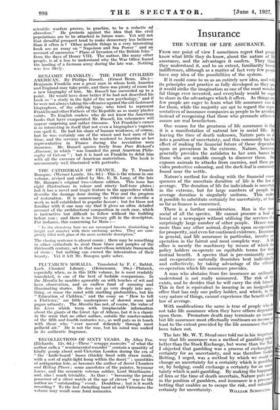PLUTARCH'S MORALIA. Translated by F. C. Babbit. Loeb Classical Library.
(Heinemann. 10s.)—Plutarch, especially when, as in this little volume, he is most readably translated, is one of the best of bedside companions. In the Moralia he rambles agreeably on with touches of wit and keen observation, and an endless fund of amusing and illuminating stories. He does not go very deeply into any- thing, or rouse the mind with startling profundities, but his " Education of Children," and the essay on " How to tell a Flatterer," are little masterpieces of shrewd sense and pagan urbanity. The Moralia has not, of course, the value of his Lives which teem with irreplaceable information about the giants of the Great Age of Athens, but it is a classic in the sense that no other author, outside the master-minds of the fifth and fourth centuries n.c., so well puts us in touch with those who " ever moved delicately through most pellucid air." He is not the rose, but his mind was soaked in its authentic fragrance.






































 Previous page
Previous page